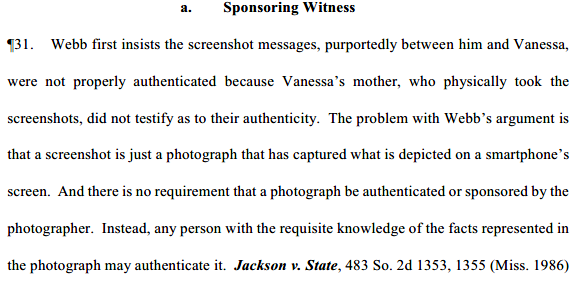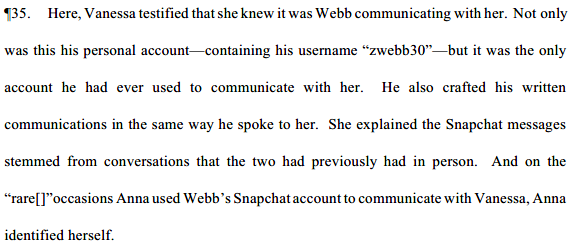The Mississippi Supreme Court handed down two opinions today and each packs a punch. Webb v. State has a thorough and concise analysis of issues surrounding the authentication of screenshots of Snapchat messages. Ware v. Ware is a multifaceted, chancery court battle-royale among family of the decedent involving primarily the fate of the decedent’s shares of family corporations.
Webb v. State, 2021-KA-00082-SCT (Criminal – Felony/Authentication of Social Media)
Affirming conviction of one count of fondling and three counts of sexual battery of two underage girls, holding that the circuit court did not abuse its discretion in a slew of evidentiary rulings including (1) the admission of prior sexual abuse by the defendant; (2) the admission of a photo of an entry from a diary belonging to one of the victims; (3) the admission of screenshots of Snapchat messages over an authentication and unfair prejudice challenges; and (4) the admission of text messages between the defendant and one victim’s mother. The Supreme Court was unpersuaded by the defendant’s final argument that his conviction was against the weight of the evidence.
(All justices concurred.)
Practice Point – This is a case to bookmark for authenticating social media content or other screenshot material. The Supreme Court took a deep dive into the issue of authenticating the Snapchat screenshots at issue in this case. The screenshots at issue were taken by one victim’s mother, but the mother did not provide authenticating testimony. The Court analogized screenshots to photos, and held that screenshots do not have to be authenticated by the person who took the screenshot:

[Legal writing sidebar: I like Justice Maxwell’s use of “And” to start the third sentence. We were all told at some point that one should never begin a sentence with a conjunction. But I think doing so here effectively added clarity and concision to the opinion.]
The defendant also asserted that the State failed to offer an adequate foundation for the screenshots because they did not prove that he was on the “other side” of the Snapchat communications with one of the victims. The Supreme Court noted that something more than a profile photo and an account name is required, but that “something more” can be established in many ways including circumstantial evidence:

Ware v. Ware, 2020-CA-00702-SCT (Civil – Wills, Trusts, and Estates)
Affirming in part and reversing/remanding in part a direct appeal and affirming in part and dismissing as moot in part a cross-appeal of a messy, consolidated estate case and corporate dissolution case between and among a surviving wife and the three children (a son and two daughters) she had with the decedent. The decedent owned 25% each of four family corporations. His will placed most of his assets including these shares into testamentary trusts for which his wife and three children were trustees, and the primary beneficiary was the wife with limited distribution potential to the children. Unsurprisingly, litigation ensued over how to manage the corporations and dispersion of the decedent’s assets.
The son filed for dissolution of the corporation, the chancellor denied the daughters’ motions to join/intervene, the chancellor appointed a receiver by agreed order, and the chancellor ultimately ordered that the shares by offered for sale to the corporations and then the dissolution of the corporations. The daughters appealed the denial of their motions to join/intervene and the wife appealed “a multitude of issues.” The son cross-appealed the chancellor’s net asset value determination date and methodology.
The Mississippi Supreme Court (1) reversed the chancellor’s ruling that the estate must offer the shares to the corporation prior to transferring them to the trusts, (2) affirmed the chancellor’s denial of the motions to intervene, (3) affirmed the chancellor’s decision to dissolve the corporations, and (4) reversed the dissolution judgment to the extent that it allowed the corporations to purchase shares from the estate. Accordingly, the Court remanded the case back to the chancery court to determine how to distribute the money from the sales of the corporations in which the estate holds 25% of the corporate shares.
(Chief Justice Randolph did not participate.)
Note – There is a lot more happening in the details of this opinion that I am not going to wade into here. If something mentioned above touches your practice areas, you will need to dive in yourself.
Other Orders
Grayson v. State, 1998-DP-01782-SCT (dismissing pro se motion to carry out execution forthwith)
Sims v. Sims, 2020-CT-00327 (denying cert) (grandparents, if you want to spend a lot of money to accomplish little more than firebombing your family, suing your children for grandparent visitation may be right for you)
Westmoreland v. State, 2020-CT-00509-SCT (denying cert)
Wilson v. State, 2020-CT-00762-SCT (denying cert)
Flechas v. The Mississippi Bar, 2021-BA-01051-SCT (granting motion to accept the irrevocable resignation of Eduardo A. Flechas)
In Re: Hon. James McClure, III and Hon. Gerald W. Chatham, Sr., 2022-IA-00319-SCT (treating petition for writ of prohibition filed by Circuit Court Judges James McClure, III, and Gerald W. Chatham, Sr., as a petition for interlocutory appeal pursuant to M.R.A.P. 5; granting permission to appeal, and directing all judges of the Circuit Court of the Seventeenth Judicial District are hereby to appear before Mississippi Judicial College Director Randy G. Pierce for a conference to consider the simplification of the issues and such other matters as may aid in the disposition of the proceeding by the Court, including settlement)
